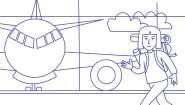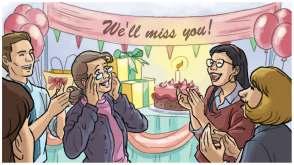
Cambridge University Press 978-1-108-74306-8 Think Level 3 Student's Book British English, 2nd Ed. Herbert Puchta , Jeff Stranks , Peter Lewis-Jones Excerpt More






READING
1 What are the people doing in the photos? Are these things you do or would like to do? Why?


2 Tick (✓) the things you would like to do when you finish school. Then add two more ideas of your own. travel to other countries go to university or college go into business get any job you can find do any job you can and spend time on your hobbies find work that provides training on the job do volunteer work





3 SPEAKING Work in pairs. Compare your ideas from Exercise 2. Give reasons for your choices. 4 Read John’s blog post on the next page and the replies to it quickly. Which three photos show activities that these people do now?
Amy Mark Pauline 5 1.01 Read the article again and listen. Mark the sentences T (true) or F (false). 1 John is unsure what to do when he leaves school. 2 John is worried about his exam results. 3 Amy went to Thailand to learn the language. 4 Amy has got plans for when she leaves Thailand.
Mark’s advice is to do a course. 6 Pauline got a job before she finished her university course.


www.cambridge.org © in this web service Cambridge University Press A C D E B
Information
01
5
OBJECTIVES FUNCTIONS: talking about the future; complaining GRAMMAR: present tenses (review); future tenses (review) VOCABULARY: making changes; life plans; phrases with up Watch the video and think: are you good at making decisions?
1BIG DECISIONS
What next?


John posted 2 hours ago







Amy posted 5 minutes ago
Hi, John. I’m doing a gap year right now. I saved up some money and went to Thailand, but after two months of ‘holiday’ I got bored and the money was running out. Then I learned about a volunteer medical organisation working in poor parts of the country and they let me join as a driver. Now I’m working, struggling with the Thai language (I spend up to an hour a day practising with friends) and learning lots about myself. I’ve made a resolution, too – when I go home, I’m going to study medicine, to be a doctor or a nurse. So my advice? Do a gap year, but don’t just travel around –do some volunteer work somewhere. For me, it’s been life-changing.



Mark posted 28 minutes ago
Hey! I left school three months ago and I didn’t want to go to university or travel. So I’m doing a course. I’m studying to become a yoga teacher. I took up yoga a couple of years ago and I’ve loved it ever since. I was quite lazy at school, but I’ve changed my ways and now I study really hard. The course starts every day at 7.00, so I’ve had to get into the habit of waking up early. But that’s fine – I love what I’m doing. That’s the important thing – do what you love, if you can.








Pauline posted 1 hour ago
My time at school is almost up, and of course I’m thinking about the big question: what next? Perhaps I’ve left it a bit late to start thinking about it, but that’s how I am. I think I’ll do well in my exams, so maybe I’ll go to university or college and get more qualifications – but I’ve been asking myself if it’s better to just find a job and start a career that way. On the other hand, if I do go on to study further, should I do it right away or perhaps take a year off –a ‘gap year’? Helpful comments and ideas, please! Thanks. LikeShareReply
Hi there! Here’s my advice. Do what feels right for you now, but keep an open mind and be prepared to change. Some of my friends went travelling after school, but I didn’t have the courage; I just went to university. It was OK and I was having a good time. Then one day an old friend from school phoned me and said he was going to start an online company and asked me to join him. So, I gave up the university course and went to work with him. It was the best thing I’ve ever done. I wasn’t intending to leave university, but I took the chance to try something different, and I don’t regret it.
Reading between the lines
Sometimes a writer doesn’t tell us everything directly: we need to draw conclusions from the information the writer gives. We call this ‘reading between the lines’.


6 Answer the questions and give reasons for your answers.
























0 Is John worried about his abilities as a student? No, he says he’ll do well in his exams and he’s thinking about university.

1 Has Amy been enjoying her work with a medical organisation?

2 Is Mark different now to when he was at school?

Press
3 Did Pauline want to travel after leaving school?
SPEAKING

7 Work in pairs. Discuss these questions.
1 What resolutions are you going to make for this school year?
2 What do you think is the secret of changing your life for the better?

Plan carefully. Do work first, play later.
Listen to your parents.
University Press
Think Level 3 Student's Book British English, 2nd Ed. Herbert Puchta
Jeff
Excerpt More Information www.cambridge.org © in this web service
Cambridge
978-1-108-74306-8
,
Stranks , Peter Lewis-Jones
Cambridge University
LikeShareReply LikeShareReply LikeShareReply
BIG DECISIONS UNIT 1
Cambridge University Press
978-1-108-74306-8 Think Level 3 Student's Book British English, 2nd Ed.
GRAMMAR Present tenses (review)
1 Match sentences (1–4) with the tenses (a–d) and then complete the rule with the names of the tenses.
1 I’m thinking about the big question: what next?
2 I’ve been asking myself if it’s perhaps better to just find a job.
3 I spend up to an hour a day practising with friends.
4 I’ve made a resolution.
a present perfect continuous b present simple c present continuous d present perfect

RULE:
We use the 5 to talk about something that happens regularly. We use the 6 to talk about what’s happening at or around the time of speaking. We use the 7 to talk about past actions without saying when they happened. We use the 8 to talk about actions that started in the past and are still happening.
Look
We can use the present continuous with always to complain about behaviour that we don’t like and find annoying. My dad’s always telling me what to do.
2 Complete the text with the correct present tense forms of the verbs. Sometimes more than one tense is possible.
It’s 2 am and I 1 (lie) in bed. I 2 (try) to get to sleep, but I can’t. I 3 (have) trouble sleeping for about a month now. I 4 (try) different things to help me sleep, but nothing 5 (work). My mind 6 (not want) to stop. A lot 7 (happen) in my life right now. It’s exam time, so I 8 (study) a lot. There’s also the question of next year. I 9 (think) about it for ages. Mum and Dad 10 (want) me to go to university, but I’m just not sure what to do.
3 SPEAKING Work in pairs. Think about a problem you’ve been having and tell your partner.
I’ve been fighting a lot with my little brother recently. I’ve tried to ignore him, but it’s impossible.
VOCABULARY Making changes
4 Match the phrases with the definitions. 0 make a resolution f 1 give something up 2 do well 3 struggle with something 4 take something up 5 take the chance (to do something) 6 get into the habit (of doing something) 7 change your ways a stop doing something b start doing something regularly c use an opportunity d find something difficult e start a new hobby or interest f decide to make a positive change g do things differently (usually for the better) h be successful
5 Complete the email with the missing verbs.
New Year’s resolutions?
Last year I 1 loads of resolutions and decided to 2 my ways. I tried to 3 the habit of getting up early. For two months I got up at 8 am, and I even 4 running before going to school. But I started falling asleep in the afternoon, so I soon 5 that idea! Then I stopped eating meat. I was 6 well until Mum made roast beef. I just had to eat it. I also 7 the chance to start learning the piano when my school offered extra classes. But I 8 with finding time to practise, so I stopped. This year I’ve only made one resolution: not to make any resolutions!
6 SPEAKING Work in pairs. Discuss these questions.
1 What subjects are you doing well in at school?
2 What subjects do you struggle with?
3 What was the last thing you gave up doing? Why?
www.cambridge.org © in this web service Cambridge University Press
Herbert Puchta , Jeff Stranks , Peter Lewis-Jones Excerpt
More Information
Sam Sam@thinkmail.com
workbook page 12
workbook page 10
Cambridge University Press







978-1-108-74306-8 Think Level 3 Student's Book British English, 2nd Ed.








Herbert Puchta , Jeff Stranks , Peter Lewis-Jones Excerpt More Information
LISTENING
7 SPEAKING Work in pairs. Discuss these questions.
1 What do you know about these people?
2 Can you match the information with each person?
A was a famous painter.
B is a film actress. C started a film studio.
8 1.02 Listen and check.
9 1.02 Read the questions carefully.
Listen again and make notes.
1 What is Alan worried about?
2 Why does Becky tell Alan about Carey Mulligan?

3 Why was Walt Disney unsuccessful at first?

4 What does Alan not like about the example of Van Gogh?







5 How does Alan compare himself to Van Gogh?


10 SPEAKING Work in pairs. Compare your answers to Exercise 9.

GRAMMAR
Future tenses (review)




11 Look at the sentences from the listening. Complete them with the correct future forms of the verbs. Then complete the rule with the present continuous, going to or will
1 We (have) a party at our place.
2 Are you (apply) to other drama schools?
3 I’m sure one of them (say) yes.
RULE:
• To talk about future arrangements, we often use the 4










• To make predictions, we often use 5
• To talk about intentions, we often use 6
12 Choose the best tense.
1 We’ll go / We’re going to the beach this Friday. Do you want to come?
2 I don’t think I’ll finish / I’m finishing this homework.



3 I won’t go / I’m not going to university this year. I want to take a year off.
4 I’ve got an appointment with the dentist tomorrow. I’m seeing / I’ll see her at 10 am.
5 Daisy’s learning to fly. She’ll be / She’s going to be a pilot.
6 I’m not eating / going to eat chocolate. That’s my resolution for next year.
7 Argentina will win / are winning the next World Cup. That’s what I think.
8 We’re flying / We’ll fly on Friday. I’m so excited.
13 Write down:


1 two arrangements you’ve got for this week. 2 two intentions you’ve got for this year. 3 two predictions for your life.

www.cambridge.org © in this web service Cambridge University Press
workbook page 11
02
UNIT 1 BIG DECISIONS
Cambridge University Press










978-1-108-74306-8 Think Level 3 Student's Book British English, 2nd Ed.






READING
1 SPEAKING Tick (✓) the statements you agree with. Add one more thing you think is important. Then discuss in pairs. A good life means … getting rich. having friends who care about you. settling down and having a family. liking what you’ve got and not thinking about what you haven’t got. doing work that’s important for you.
BEFORE I SETTLE DOWN –



A LIST
2 1.03 Listen and read the text. Put the phrases (a–f) into the correct spaces. Listen and check. a that’s the point b play live c really scares me

d a good experience e is allowed f raise money

3 SPEAKING Work in pairs. Discuss these questions.
1 Which of the things on this list would be on yours, too? 2 What other things would be on your ‘before I settle down’ list?
A British billionaire once said: ‘You only live once, but if you do it right, once is enough.’ I love that quote, but what does ‘doing it right’ mean?






I suppose my grandparents did it right. They both left school, went to university (where they met) and got degrees. They started careers (he was an accountant, she was a doctor), then they got married and started a family. They got promoted at different times and then they both retired at 60. And off they went to travel the world. They’ve been happy, I think. However, it’s just not really what I want – not yet, anyway. Before I settle down, when I’m 30 or so, I want to do all kinds of things. Here are some of them.
1 Do something that 0 c . I’m terrified of heights, so sky-diving would be perfect!
















2 Sleep on a beach under the stars. Where? Somewhere warm, of course, where sleeping on the beach 1

3 Take a really long train ride. The destination doesn’t matter, it’s the journey that’s important. Train travel is brilliant –you can see the places you’re passing through, you can meet and chat with other travellers, you can leave your seat and walk around. I love it!

4 Go somewhere where they don’t speak English and I don’t speak the language (Nepal?). It’ll be hard, of course, but 2 !










5 Run a marathon. I’m not a good runner and perhaps I’m not up to a marathon, but I’d really like to try. And perhaps I can 3 for my favourite charity (cancer research). 6 Learn how to cook at least ten things that I love to eat. Right now I can only cook two! 7 Have dinner with a friend in one of the world’s best restaurants.

8 See lots – lots! – of my favourite bands 4 . 9 Do some kind of volunteer work for a while. In other words, work in order to help other people, not myself (though it’ll be 5 for me, too). Make a list of other interesting things to do before I’m 40! 10
OK, that’s my list. It’s up to me to try to do these things. What would be on your list?
www.cambridge.org © in this web service Cambridge University Press
Herbert Puchta , Jeff Stranks , Peter Lewis-Jones Excerpt
More Information
VOCABULARY Life plans

5 Complete the text with phrases from Exercise 4. Use the correct forms of the verbs.


My uncle has always done things differently. He 1 when he was 18 because he wanted to see other places. He spent the next twenty years 2 , working in restaurants and hotels in many different countries. When he was in his early forties, he decided to return to the UK. He went to university and 3 He did really well, and when he finished, he 4 as a translator. Because he was good at his job, he 5 quite quickly and he soon became Head Translator. When he was 48, he met the love of his life and they decided to 6 and 7
Now he’s 55, with three young children. He says he wants 8 soon. He wants to stop working and take the whole family around the world with him. I wouldn’t be surprised if he does.
WordWise: Phrases with up

6 Match the phrases in bold with the definitions.
1 What’s up, Alan?
2 I spend up to an hour a day practising with friends.

3 What are you up to tomorrow night?
4 My time at school is almost up 5 It’s up to me now to try to do some of the things.
6 Perhaps I’m not up to a marathon. a finished b doing c what’s the matter? d capable of e as long as / to a maximum of f my responsibility

7 Use words and phrases from Exercise 6 to complete the sentences.

1 What have you been recently?
2 The time is almost . Two more minutes!
3 Oh, no! You look really unhappy. ?
4 It isn’t my decision. It’s you to decide.
5 He’s 75 now, so he isn’t long walks.
6 This car can carry six people. workbook page 12
PRONUNCIATION
Linking words with up Go to page 120.
8 Write an email to an English-speaking friend in another country. Describe your resolutions for the coming school year. Write about:

• bad habits you’re changing • new classes you’re taking • activities you plan to take up • why you’re doing all of this

Think Level 3 Student's Book British English, 2nd Ed.
More Information www.cambridge.org © in this web service Cambridge University Press
Cambridge University Press 978-1-108-74306-8
Herbert Puchta , Jeff Stranks , Peter Lewis-Jones Excerpt
4 Match the phrases with the pictures. Write 1–8 in the boxes. 1 retire 5 start a family 2 travel the world 6 settle down 3 start a career 7 get promoted 4 get a degree 8 leave school
WRITING An email about resolutions
workbook page 12
A E F G H C B D UNIT 1 BIG DECISIONS
Cambridge University Press 978-1-108-74306-8 Think Level 3 Student's Book British
1 1.06 Look at the photo. How is the girl feeling? Listen and read to check.
Martin: Hi, Sandra. I haven’t seen you for ages. Where have you been hiding?
Sandra: Hi, Martin. Hiding? Nowhere. I’ve just changed some of my routines. I was feeling so stressed a few months ago that I thought, ‘Sandra, you’ve got to make some changes.’ So I did!
Martin: What kind of changes? Exercise? Sleep?
Sandra: Well, where shall I start? I’m eating better. And now you mention it, I’m trying to get seven hours sleep a night, minimum. But the big thing is my attitude.
Martin: And how has that changed?
Sandra: Well, I read an article about stress and it said something like ‘Look at the big picture. How important is this problem? Is it going to matter in three months’ time?’ And I thought, that’s right –the problem is, I worry about little things too much. So I’m trying to worry less.
2 1.06 Read and listen again to the dialogue. Answer the questions.
1 What areas of her life does Sandra say she’s changed?
2 How much sleep is she trying to get?
3 What advice did she get from the article?
4 What is Martin getting stressed about?
3 SPEAKING Discuss the questions in pairs. What do you think?
1 Do things like diet and sleep help with stress?
2 Does the article give good advice? Why or why not?
3 Is it possible to slowly reduce how much you worry?

Phrases for fluency
4 Find the underlined expressions in the dialogue. How do you say them in your language? Use the expressions to complete the conversations.
1 A You look tired. Has it been a busy day?
B Busy?
? First, I had a Maths test. Then I had Drama club at lunchtime. Then it was a five-kilometre run in PE …
A Well, you just sit down and I’ll get you something to eat.
B Thanks, Mum.
2 A , Annie? I haven’t seen you for days.
B I haven’t been anywhere. You’re the one who disappeared.
A , I have been quite busy.
Martin: But can you do that? If I’m honest, I’m a terrible worrier, too. But I can’t stop.
Sandra: Don’t be silly. Anyone can stop worrying – not overnight, but you can do it little by little.
Martin: Now I’m getting stressed about being someone who can’t stop worrying.
Sandra: Let’s go and have ice cream and talk more.
Martin: Thanks, Sandra. You’re a star.
Sandra: Here we go, then! Ice cream coming up! And don’t worry, I’ll pay!
3 A It’s ten o’clock. Time for the test. B ! I’m really not ready for this.
A Me neither. I’ve got a feeling I’m not going to pass. B
. You always pass.
FUNCTIONS Expressing dissatisfaction

KEY LANGUAGE
I’m not happy with (my attitude)
The thing / problem is, (I worry too much)
If I’m honest, (I’m a terrible worrier, too). My parents are always (telling me to work harder)
5 Match the parts of the sentences.
1 I’m not happy with 2 He’s always 3 If I’m honest, 4 The problem is,
a he just laughs when I complain about it. b I don’t like his attitude.
c borrowing my things without asking me. d the things my brother does.
ROLE PLAY Work in pairs. Student A: go to page 127. Student B: go to page 128.
English, 2nd Ed.
www.cambridge.org © in this web service Cambridge University Press
Herbert Puchta , Jeff Stranks , Peter Lewis-Jones Excerpt
More Information
LIFE COMPETENCIES





























































Managing stress
5 SPEAKING Work in pairs. Answer the questions.

































1 When does stress have a negative effect on us?
2 Why does the writer think people are more stressed these days?
3 Do you agree that the things mentioned in the article cause stress?
4 Can you think of any other reasons why people feel stressed?
Me and my world
6 Make notes under the headings to show how your family, your friends and school might cause stress.

1 03 Watch the vlog. Why is Leo feeling stressed? 2 03 Watch the vlog again and make notes about: a three symptoms of stress. b three things you can do to deal with stress. 3 Compare your notes with a partner.

4 Read this online article about stress. When can stress be useful?









ALL ABOUT STRESS
We tend to think of stress as negative, but in fact it’s something normal. Stress is our body’s natural way of reacting to a difficult situation. Stress improves our ability to perform under pressure and to avoid danger. Cavemen hunting dangerous animals for food felt stress, and famous singers perform better on stage because of stress. However, stress becomes a problem when it reaches high levels and continues for a long period of time.
People seem to feel more stress these days. Money is one source of stress. Not having any money at all is very stressful, but for most of us, the problem is that we always want something better or newer. And we worry unnecessarily about things we can’t afford.

Things like mobile phones can be a problem, too. We spend our lives moving from screen to screen, responding to a huge number of messages and images instead of really relaxing. Exercise is great for reducing stress, but technology in the form of smartphones and computers also means that we do much less exercise now than people did in the past. The level of stress in our daily lives means that when we have to face really challenging situations, like doing exams or performing in public, our bodies are often less able to cope with them in a positive way.
FAMILY FRIENDS SCHOOL
7 SPEAKING Think of a time when you were stressed. Talk to your partner about:
• how you felt.
• what you did.
• what you would do differently in the future.
TIPS FOR MANAGING STRESS
• Tell people how you are feeling. Being strong means sharing, not hiding feelings.
• Be patient – try not to worry about things you can’t control.
• Get enough sleep and exercise, and eat healthily.
Cambridge University Press 978-1-108-74306-8 Think Level 3 Student's Book British English, 2nd Ed. Herbert Puchta , Jeff Stranks , Peter Lewis-Jones Excerpt More Information
UNIT 1 BIG DECISIONS
Stress can cause health problems, emotional problems and relationship problems. Finding ways to reduce or manage stress helps you feel healthier and happier, and be a better friend.






Cambridge University Press 978-1-108-74306-8 Think Level 3 Student's Book British English, 2nd Ed. Herbert Puchta , Jeff Stranks , Peter Lewis-Jones Excerpt More Information www.cambridge.org © in this web service Cambridge University Press READING 1 Look at the pictures and answer the questions. 1 What do the pictures illustrate? 2 Where were the people from? 3 What happened to them? 2 Read the article quickly. What is the big difference between James Ramsay and Mary Prince? 3 2.01 Read and listen to the article. Write R (Ramsay) or P (Prince) after each statement. 1 Showed no discrimination 2 Tried to escape their life 3 Was separated from their parents when only a child 4 Came from a family of slaves 5 Was not popular with the local slave owners 6 An event on a ship changed their life 7 Their life became the subject of a book 8 Helped slaves with their medical problems Watch the video and think: would you like a demanding job when you leave school? 04 OBJECTIVES FUNCTIONS: talking about the past GRAMMAR: narrative tenses (review); would and used to VOCABULARY: descriptive verbs; time periods 2 A HARD LIFE
Cambridge University Press













978-1-108-74306-8

A DIFFERENCE THEY MADE
THE SLAVE TRADE



From the 16th to the 19th century, millions of people in Africa were taken from their homes and forced into lives of slavery. By the late 18th century many people had realised this was wrong and wanted to stop it. These people became known as ‘abolitionists’ and together they helped demolish one of the cruellest systems in the history of our world. Here are two of the men and women who made a huge difference.
One day in November 1759, the British ship Arundel was sailing the West Indies when a slave ship approached it, begging for help. Many of the slaves on the ship had died of disease and the others were living in horrible conditions. One person from the Arundel went to help – a young doctor called James Ramsay. He was horrified by what he saw and he never forgot this experience. Soon after this, he went to work on the island of St Kitts in the Caribbean. There he enraged local businessmen as he helped the slaves who worked for them and treated them for injuries and disease. He also worked as a church minister and he insisted on opening his church up to slaves as well as the white people. When Ramsay returned to England, he wrote books about his experiences. The vivid details he included shocked many people. He was also a huge influence on William Wilberforce, the leader of the antislavery movement in the UK and a politician who worked tirelessly to smash the laws and eventually succeeded in doing just that.
Mary Prince was born in Bermuda in 1788. As her mother and father were slaves she was a slave, too. She was sold a total of four times in her life. The first time with the rest of her family, but when she was 12, she was separated from them and went to work as a maid. She had been working at this job for a few months when she ran away to be with her mother, but she was soon captured and sent back. The third time she was sold to work in the salt ponds. The work was long and hard and the sun caused blisters on her body. She was also treated cruelly by her owners, who often struck her for the smallest of things. When she was 40, new owners took her to England. Slavery was illegal in the UK, so she was able to go and work with the abolitionists. In 1831, the Anti-Slavery Society published a book about her life story called The History of Mary Prince Lots of people read the book and it helped many change their minds about slavery.
Following an idea through a paragraph It can be difficult to follow what a writer is trying to say in a longer paragraph. We need to read carefully to understand fully what the writer is saying.
4 Answer the questions.
In paragraph 2 it says: ‘he wrote books about his experiences.’
1 Look back at the paragraph. What were his experiences? Make a list of them.
Near the end of paragraph 3 it says: ‘the Anti-Slavery Society published a book about her life story ’
SPEAKING

5 Work in pairs. Discuss these questions.
1 Who would you suggest for the ‘They Made a Difference’ series?

2 Why would you include this person?

www.cambridge.org © in this web service
Think Level 3 Student's Book British English, 2nd Ed. Herbert Puchta , Jeff Stranks , Peter Lewis-Jones Excerpt
More Information
Cambridge University Press
A HARD LIFE UNIT 2




































































































































































































































































